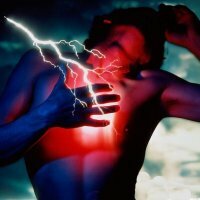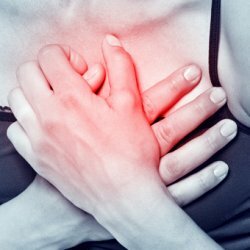Myocardial infarction: symptoms

Myocardial infarction is associated with necrosis of the heart tissue. It causes a stop or rupture of the heart, ventricular fibrillation, acute heart failure and other conditions that put a person's life in danger. To successfully arrest the effects of myocardial infarction, it is necessary to recognize it in a timely manner by characteristic symptoms. However, myocardial infarction has various symptoms, which largely depend on the location, size, the area of the heart muscle, as well as on the general condition of the person and the characteristics of his body.
Large-heart infarction and its symptoms
Is a consequence of necrosis of a significant area of the myocardium( cardiac muscle).There are several stages of a large-heart infarction, with each stage being accompanied by its signs. For early recognition of myocardial infarction, it is necessary to know the manifestations of this pathology at all stages.
The prodromal period( or pre-infarction) of myocardial infarction is accompanied by severe attacks of angina pectoris. Often seizures become more painful, longer, more difficult to stop drugs. During this period, patients complain of feeling depressed, anxious.
Angina in an exacerbation, a feeling, the so-called angina pectoris, should alert the patient and requires immediate medical attention.
Myocardial infarction in the acute period
Sometimes myocardial infarction does not present itself pre-infarction period, but quickly develops into the most acute stage. Usually this period follows the pre-infarction stage. At this point, the necrosis of the heart muscle, which is a myocardial infarction.
Symptoms of the acute period
Severe pains occur suddenly and can last from half an hour to several hours, and even a day. A prolonged pain attack indicates that myocardial infarction affects new areas of the heart muscle. The intensity of pain can vary, but more often it is stinging, violent. In most cases, the pain is localized in the left side of the chest and behind the breastbone. Painful sensations are given, then the network radiates, to the left shoulder, to the neck, to the back, to the area between the shoulder blades and even to the lower jaw. It is rare, but it is possible that the pain radiates to the hip or to the inferior ileal fossa. It is important not to confuse such a pain caused by a heart attack, with pain in diseases of organs located in the abdominal cavity. In diabetics, the pain syndrome may be weak, since their nerve fibers responsible for conducting pain impulses are damaged. There are rare cases when there was no pain in the infarction.
General condition of patient
A patient with myocardial infarction feels anxiety, severe weakness, shortness of breath, lack of air. His skin becomes pale, throws into cold sweat. Arterial blood pressure rises, then falls. There is dizziness, a syncope is possible.
The acute stage of an infarction can last up to a week or longer. At this time, the affected area of the infarction is limited from healthy tissues. The main symptoms accompanying this period are signs of heart failure( weakness, dyspnea), a rise in temperature to 38.5 degrees. This period is dangerous because the infarct can repeat itself or give a complication.
In the subacute period of the infarction, the final formation of the infarction zone occurs, and then the replacement of this area with a connective tissue scar. The duration of the subacute period is a month or more. Symptoms of heart failure persist, high fever gradually decreases, and arterial pressure, on the contrary, increases steadily. After suffering a heart attack in patients with hypertension, systolic pressure may not significantly increase. The diastolic, on the contrary, keeps high. This condition is called "decapitation of arterial hypertension."After a heart attack, angina attacks may disappear, which means complete blockage of the artery causing angina pectoris. In the event that the attacks of angina remain the same, the risk of repeated myocardial infarction remains.



